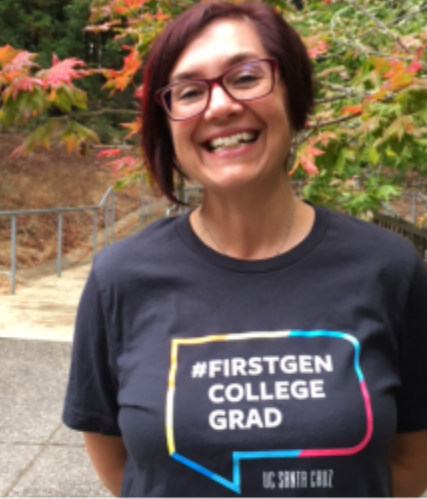Teresa Maria Linda Scholz, Campus Diversity Officer
 I am a first generation USAmerican—my parents immigrated to Los Angeles from Guatemala. My siblings and I were born here in the US. We grew up in L.A. (Huntington Park) and in the Bay Area. In 1981, my father (who remarried to my stepmother) relocated us back to Guatemala, where I completed 5th through 8th grades, returning to the US as a frosh in high school (midway through the US academic year). After high school, my parents moved to Chico, CA. Unsure about my ability to start college, I worked as a Nurse Assistant at an assisted nursing facility in Chico. Several months after starting work as a Nurse Assistant, I enrolled in classes at Chico State. Competing on the speech and debate team helped to ground my academic focus. I eventually was offered a Performing Arts Scholarship to compete for Colorado State University’s Speech and Debate team. I relocated to Colorado and eventually completed my Bachelor’s and Master’s degrees at CSU in Communication Studies (with a Master’s Certification in Women’s Studies), and my Ph.D. at Boulder (also in Communication Studies).
I am a first generation USAmerican—my parents immigrated to Los Angeles from Guatemala. My siblings and I were born here in the US. We grew up in L.A. (Huntington Park) and in the Bay Area. In 1981, my father (who remarried to my stepmother) relocated us back to Guatemala, where I completed 5th through 8th grades, returning to the US as a frosh in high school (midway through the US academic year). After high school, my parents moved to Chico, CA. Unsure about my ability to start college, I worked as a Nurse Assistant at an assisted nursing facility in Chico. Several months after starting work as a Nurse Assistant, I enrolled in classes at Chico State. Competing on the speech and debate team helped to ground my academic focus. I eventually was offered a Performing Arts Scholarship to compete for Colorado State University’s Speech and Debate team. I relocated to Colorado and eventually completed my Bachelor’s and Master’s degrees at CSU in Communication Studies (with a Master’s Certification in Women’s Studies), and my Ph.D. at Boulder (also in Communication Studies).
What motivated me to go to college: My stepmother encouraged me to go, but I still was unsure of myself. I just knew that it was “something I should do.” My father worked a lot, so he did not ever really talk to me about college, but he also knew that it was something “good to do.” Honestly, I stumbled into college because my friends who came from more privileged upbringings were going, and I wanted to “fit in.” Once I was in college, I progressively became more motivated because of what I was learning, and not learning. In other words, I realized early on that academic literature was frequently presented from the perspective of privileged dominant groups, consistently missing the voices from underrepresented groups, thus leaving a gap in my learning.
What the biggest challenge I encountered was as a first-generation student and how I overcame it: Part of my uncertainty in going to college stemmed from the feeling of not belonging. My formative years were spent in Guatemala during the height of
How my background has helped me: Being raised in Guatemala for part of my life was instrumental to my development and to my upbringing. It was also not
What I would tell my first-year self: The biggest piece of advice I was given, which really is more so a phrase of encouragement and assurance, was: “You do belong here!” As a result, when I experienced frustrations, as well as successes, I would repeat to myself “I do belong here” . . . to this day, I still tell myself this!
The best thing about my college experience was: I was able to make sense
How being a first-generation student influences me (and/or my work) now: My career path has been in higher education. My role as a Critical Latina/Latin American Transnational Feminist Scholar in Communication Studies was influenced by my first generation status—both as a first gen student and a first gen US citizen. I developed an academic language of resistance that called out a tradition that marginalized the voices of people from nondominant groups. Additionally, everything I do as the Campus Diversity Officer for Staff and Students is deeply rooted in and connected to who I am as a first gen student and citizen. In other words, I would not be doing this work had I not had the upbringing and experiences that I did.
